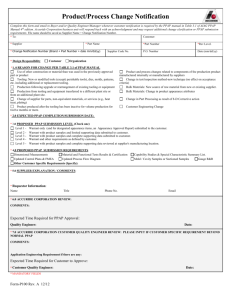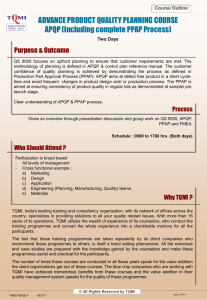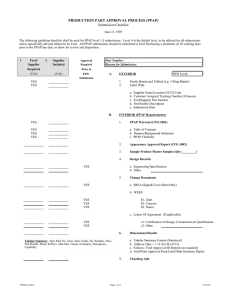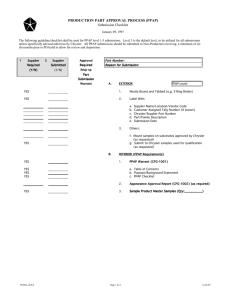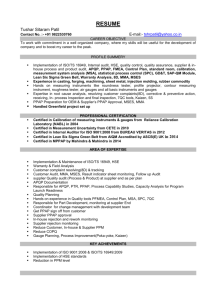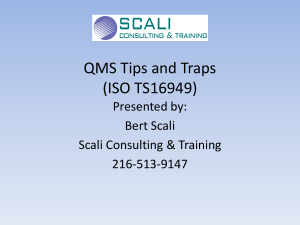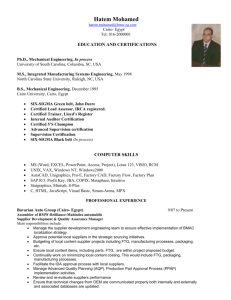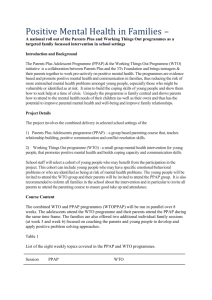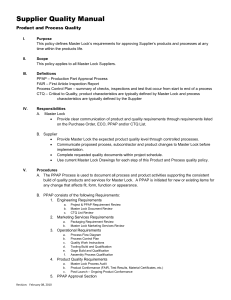Supplier Performance Development Process Task 15 PPAP
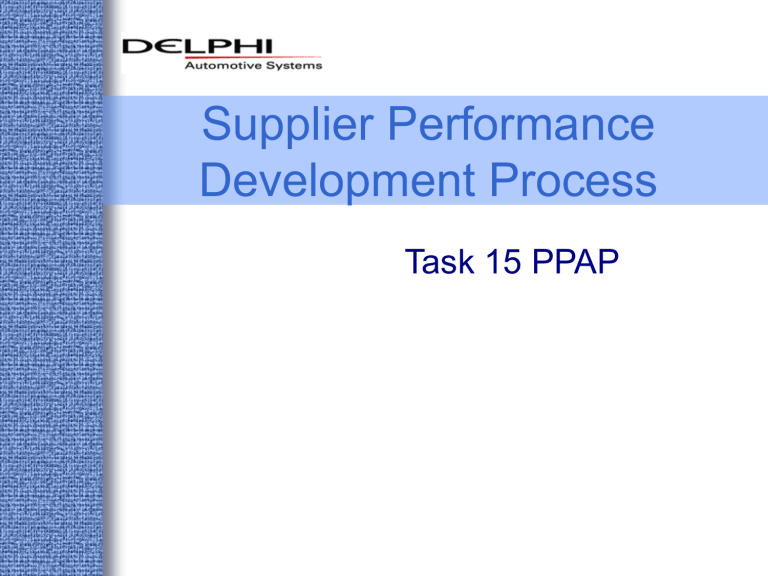
Supplier Performance
Development Process
Task 15 PPAP
Task Description
• P roduction P art A pproval P rocess (PPAP)
• Production parts are manufactured at the production site using production tooling, gaging, equipment, operators, etc
• Parts from production run are analyzed
• Test results and records from APQP are submitted with Part Submission Warrant
20-Sep-99 Task 15: PPAP 2
20-Sep-99
Purpose
For the supplier to demonstrate
– all design records and specification requirements are properly understood
– the process has the capability to produce product that meets requirements
Task 15: PPAP 3
Application
Something
Changed
20-Sep-99
AIAG PPAP manual defines when PPAP submission is required
– New part
– Correction to discrepancy in previous submission
– Design or process change
– Change in source of subcontracted materials or services
– transfer or rearrangement of tooling &
4
Methodology
• Buyer enters PPAP submission date on purchase order
• Approver determines submission level
– default level 3
– default level 4 for raw material
• Supplier submits PPAP
– PPAPALL.xls electronic submission recommended
• Approver evaluates
PPAP package
– Level 5 at supplier site
• Approver determine part submission status
• Notify supplier and manufacturing of status
20-Sep-99 Task 15: PPAP 5
Supplier Data Received
• Warrant
• Appearance
Approval Report
(AAR), as required
• Sample Parts
• Print/Design Record
• Engineering Change
Documents
• Check fixtures/aids
• Process Flow
Diagram
• PFMEA
• DFMEA
• Control Plan
• Early Production Containment
Plan (Pre-Launch Control Plan)
• Process capability studies
• Gage Measurement System
Analysis
• Lab Accreditation & scope
• Restricted & Reportable
Materials form
• Interim Worksheet, if required
Task 15: PPAP 6
20-Sep-99
PPAP Review Checklist
• Delphi checklist to assist with evaluation of PPAP package
• Action plan created with use of checklist
Task 15: PPAP 7
Flow Chart
• Linkage of Product Characteristics from
DFMEA to Operational Steps
• Operation numbers consistent with PFMEA ,
Control Plan , Operator Instructions
• Ensure identification of inspection and rework
• Use A-6 Process Flow Chart checklist in APQP manual to evaluate
20-Sep-99 Task 15: PPAP 8
PFMEA
• Linkage with DFMEA, Process Flow, Control
Plan, Operator Instructions, etc
• Degree to which high RPN’s are addressed with preventive strategies
• Action Plans assigned, implemented, effectiveness assessed and RPN recalculated
• Use A-7 Process FMEA checklist in APQP manual
20-Sep-99 Task 15: PPAP 9
DFMEA
• Assess feasibility, risk, design intent issues
• Confirm manufacturing process capability considered
• Focus on Critical Characteristics
• Lessons Learned incorporated
• Use A-1 Design FMEA checklist in APQP manual to evaluate
20-Sep-99 Task 15: PPAP 10
Control Plan
• Ensure Control Plan is aligned to, and correlates with, DFMEA, Process Flow,
PFMEA
• Control Methods appropriate to variation type(s)
• Incorporates Lessons Learned, Statistical
Data
• Use A-8 Control Plan checklist in APQP manual to evaluate
20-Sep-99 Task 15: PPAP 11
20-Sep-99
Pre-Launch Control Plan
Early Production Containment requirements
– Additional controls included for proper duration or quantity
– PFMEA and statistical data used to determine what additional controls necessary
• short term capability
• long term capability on similar process
Task 15: PPAP 12
Process Capability Studies
Capability
Ppk > 1.67
Interpretation
Process probably meets customer requirements
Conclusion
Current control plan sufficient
1.33<Ppk<1.67 Process may not meet customer requirements
Additional controls needed until Cpk>1.33
achieved
Ppk<1.33
20-Sep-99
Process will not meet customer requirements
Task 15: PPAP
100% inpection is needed until Cpk>1.33
achieved
13
MSA Studies
• Measurement uncertainty determined
– Gage R&R, Bias, Stability, and Linearity
• Gage R & R acceptance guidelines
< 10% acceptable
10-30% may be acceptable, evaluate total variation
>30% unacceptable, measuring system needs improvement
• Verify study performed correctly
20-Sep-99 Task 15: PPAP 14
20-Sep-99
Part Submission Status
• Full Production Approval
• Interim Approval
– Authorize shipment to Delphi without
Full Production Approval
– Corrective Action Plan is required
• Rejected
– Corrected submission required before production quantities may be shipped
Task 15: PPAP 15
Interim Part Class
A parts from production tooling and meet specs, not all PPAP requirements have been met
C parts not from production tooling, parts meet specs
D parts do not meet specs
B parts from production tooling and require rework to meet specs
E parts do not meet specs and vehicles with class E parts require retrofit to make them saleable
20-Sep-99 Task 15: PPAP 16
Summary
• AIAG PPAP manual defines requirements
• APQP Product and Process Validation
• Supplier submits PPAP to proper level
• PPAP package evaluated and status determined
• Supplier and Delphi manufacturing site notified of PPAP approval status
20-Sep-99 Task 15: PPAP 17
Reference Documents
• AIAG PPAP, SPC, MSA,APQP and Control
Plan manuals
• GM 1411 Interim Approval Worksheet
• AIAG QS-9000 Manual
• Appendix 20: PPAP checklist
• Appendix 13: PPAPALL.XLS
20-Sep-99 Task 15: PPAP 18
